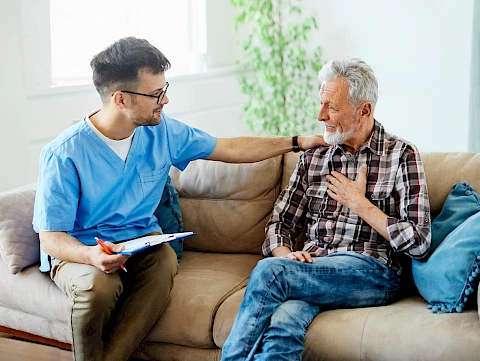
As caregivers, we often bear witness to the unique challenges faced by the senior veterans we support. Among these challenges, Post-Traumatic Stress Disorder (PTSD) stands out, prevalent among many who have served in our armed forces. Understanding and supporting senior veterans with PTSD requires patience, compassion, and a deep comprehension of this complex condition.
PTSD in Senior Veterans
Post-Traumatic Stress Disorder, or PTSD, is a mental health condition primarily caused by experiencing or witnessing a terrifying event. Many military veterans experience this disorder as a result of combat or other distressing experiences during their service. As veterans age, the symptoms of PTSD may become more pronounced, often exacerbated by health problems, retirement, or the death of loved ones.
It's essential to recognize the common triggers and symptoms of PTSD in senior veterans, which can include anxiety, nightmares, flashbacks, memory troubles, and heightened reactions to sudden noises or movements. Knowing these triggers can help caregivers manage the environment and interactions to minimize distress.
Supporting Senior Veterans With PTSD
Creating a safe, calm, and supportive environment is crucial to helping senior veterans with PTSD. This involves adopting strategies that help manage triggers and reduce stress. Simple steps like reducing exposure to loud sounds, maintaining a predictable daily routine, and providing reassurance during episodes of anxiety can significantly alleviate distress.
Equally important is the way you communicate with a senior veteran about their PTSD. Approach the subject with empathy and respect. Avoid pushing them to discuss traumatic experiences unless they're comfortable doing so. Instead, focus on providing emotional support and encouraging them to express their feelings.
Accessing Professional Support
Caring for a senior veteran with PTSD can be challenging. That's why professional support is valuable and often necessary. The good news is a wealth of resources are available to caregivers and veterans alike. These include therapy and counseling services, support groups, and specialized care programs like those offered by Senior Helpers Treasure Coast.
Caring for Yourself as a Caregiver
Don't overlook your well-being. Caring for a senior veteran with PTSD can be emotionally taxing and mentally exhausting, which is why self-care is vital. Look after your physical health, take breaks when needed, and engage in relaxing and rejuvenating activities.
Remember, it's okay to seek help and lean on others. Joining a support group can be a great way to connect with individuals dealing with similar experiences. It provides a platform to share, learn, and feel understood while offering practical advice and emotional comfort.
Senior Helpers Treasure Coast Supports Senior Veterans With PTSD
Caring for senior veterans with PTSD is a journey that demands understanding, patience, and compassion. By creating a safe environment, being aware of triggers, and knowing when to seek professional help, you can significantly improve their quality of life. Remember, your care is invaluable, but so is your well-being. So, don't hesitate to reach out for support when necessary.
If you are in the Salerno, Stuart, Palm City, Jensen Beach, or Sebastian areas, we are here to provide the professional support you and your veteran need. Contact Senior Helpers Treasure Coast today to find out more about our comprehensive services for senior veterans with PTSD.